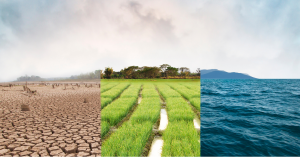A United Nations panel has released its third and final report on climate change, and following the dire warnings in the first two installments, this one strikes a hopeful tone with scientists’ plans for the world’s path forward.
The United Nations Intergovernmental Panel on Climate Change (IPCC) released the last of a three-part report, “Climate Change 2022: Impacts, Adaptation and Vulnerability,” earlier this year.
The solution is elegantly simple, according to the report: Concentrate on demand over supply. Traditionally economists have looked at supply and demand to determine how much of a good or service (supply) is needed to meet the needs of the people. Instead of focusing on supply, the report suggests taking a deeper look at demand and being more responsive to what people need versus how much can be produced.
The Fossil Fuel Industry claims people living in poverty need fossil fuels to get out of poverty. Instead, Julia Steinberger, a contributor to the report, proposes another perspective. “Energy is a means for people to get services, so let’s think about how we deliver those services in a more efficient way,” said Steinberger, an environmental economist.
Changing the way we look at energy demand has the potential of limiting 40-70% of emissions by 2050. This demand-side solution doesn’t mean giving up the comforts of our daily lives, it means being more mindful of what we use while funding clean energy climate solutions, cutting down on fossil fuels, and prioritizing sustainable, equitable policies for all.
For example, researchers at Yale have developed a Decent Living Energy model to better understand how much energy would be required for everyone in the world to live at a decent living standard. Despite the Fossil Industry’s claims, the model suggests eradicating poverty and providing decent housing options for all could help cut the world’s energy consumption demands in half. As it stands, households in the top 10% alone (in Illinois, households making over $245,173) make up for 36-45% of global emissions.
If you’re looking for an in-depth breakdown of the report, CUB recommends Drilled Podcast’s report summary from climate reporter Amy Westervelt. “The report made one thing abundantly clear: the technologies and policies necessary to adequately address climate change exist,” Westervelt clarifies. “The only real obstacles are politics and fossil fuel interests.”
If you want to do your part at home, here are some steps to start making a difference:
- Visit CUB’s Clean Energy page to learn about efficiency programs and actions that are both good for the planet and reduce your costs. Speaking of demand, Illinois has “demand-response” programs that are good for the planet as well as your pocketbook. Check them out.
- Join the CUB Action Network– The action network allows you to send messages to policymakers on key energy issues. Thousands of Illinois consumers took action over the last few years and helped pass the Climate & Equitable Jobs Act (CEJA), historic legislation that represents Illinois’ biggest step yet in fighting climate change. Currently, one of our biggest legislative battles is trying to eliminate a surcharge that’s helping to increase bills for consumers who rely on fossil fuel heat (natural gas).
Advocate for less fossil fuel dependence– Moving away from fossil fuels will take thoughtful planning over decades to come. Learn how new CUB research, part of a Better Heat Campaign, attempts to start that conversation and show how moving away from natural gas could save consumers money.

